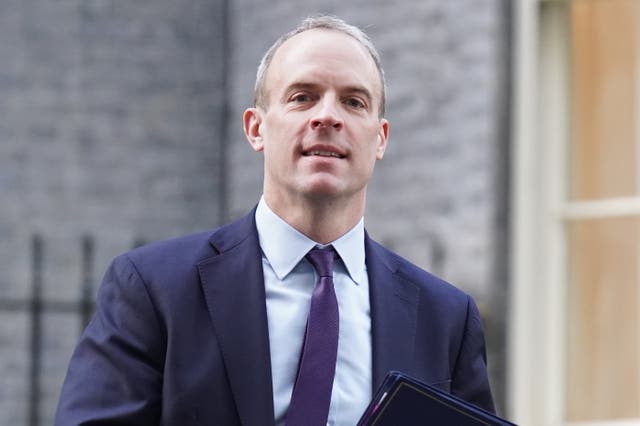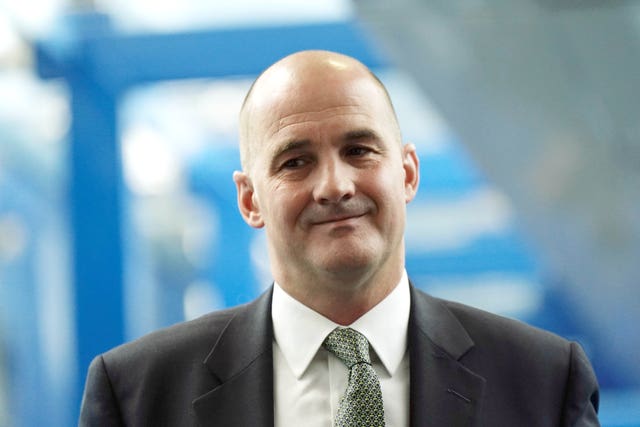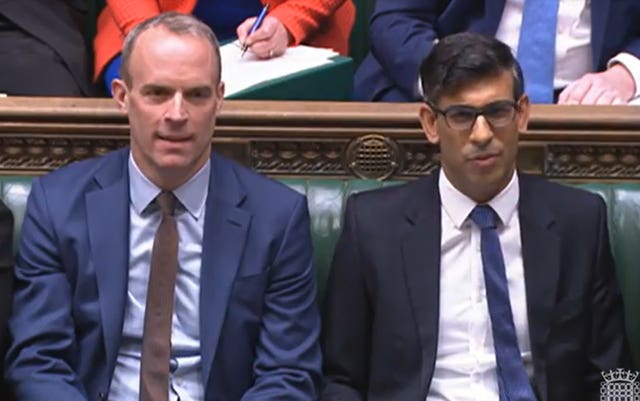Deputy Prime Minister Dominic Raab has quit Rishi Sunak’s Cabinet following the conclusion of an inquiry into bullying allegations.
Mr Sunak received the report from senior lawyer Adam Tolley KC’s investigation on Thursday and had been considering the findings since.
In a resignation letter to the Prime Minister, the Deputy Prime Minister said: “I am writing to resign from your government, following receipt of the report arising from the inquiry conducted by Adam Tolley KC.
“I called for the inquiry and undertook to resign, if it made any finding of bullying whatsoever. I believe it is important to keep my word.
“It has been a privilege to serve you as Deputy Prime Minister, Justice Secretary and Lord Chancellor.
“I am grateful to have had the opportunity to work as a minister in a range of roles and departments since 2015, and pay tribute to the many outstanding civil servants with whom I have worked.
“Whilst I feel dutybound to accept the outcome of the inquiry, it dismissed all but two of the claims levelled against me.
“I also believe that its two adverse findings are flawed and set a dangerous precedent for the conduct of good government.”
The resignation letter continued: “First, ministers must be able to exercise direct oversight with respect to senior officials over critical negotiations conducted on behalf of the British people, otherwise the democratic and constitutional principle of ministerial responsibility will be lost.
“This was particularly true during my time as Foreign Secretary, in the context of the Brexit negotiations over Gibraltar, when a senior diplomat breached the mandate agreed by Cabinet.
“Second, ministers must be able to give direct critical feedback on briefings and submissions to senior officials in order to set the standards and drive the reform the public expect of us. Of course, this must be done within reasonable bounds.
“Mr Tolley concluded that I had not once, in four and a half years, sworn or shouted at anyone, let alone thrown anything or otherwise physically intimidated anyone, nor intentionally sought to belittle anyone.
“I am genuinely sorry for any unintended stress or offence that any officials felt, as a result of the pace, standards and challenge that I brought to the Ministry of Justice. That is, however, what the public expect of ministers working on their behalf.”
Dominic Raab’s resignation letter concluded: “In setting the threshold for bullying so low, this inquiry has set a dangerous precedent.
“It will encourage spurious complaints against ministers and have a chilling effect on those driving change on behalf of your government — and ultimately the British people.
“Finally, I raised with you a number of improprieties that came to light during the course of this inquiry. They include the systematic leaking of skewed and fabricated claims to the media in breach of the rules of the inquiry and the Civil Service Code of Conduct, and the coercive removal by a senior official of dedicated private secretaries from my Ministry of Justice private office, in October of last year. I hope these will be independently reviewed.
“I remain as supportive of you and this government, as when I first introduced you at your campaign leadership launch last July. You have proved a great Prime Minister in very challenging times, and you can count on my support from the backbenches.”
– What is the report?
Adam Tolley KC, a senior employment lawyer, was appointed in November to investigate a number of allegations made against Mr Raab by civil servants who worked in his departments.
Dozens of officials are thought to be involved in eight formal complaints relating to bullying.
Mr Tolley has taken a thorough approach to examining the allegations, questioning the Deputy Prime Minister multiple times among other interviewees as well as taking written evidence.
Senior civil servants in the three Government departments headed by Mr Raab – Antonia Romeo, the permanent secretary at the Ministry of Justice, Simon McDonald, a former permanent undersecretary at the Foreign Office, and Philip Rycroft, a former permanent secretary at the now-defunct Department for Exiting the European Union – are also understood to have spoken to the inquiry.

Mr Raab was reappointed to the Cabinet by Rishi Sunak (James Manning/PA)
– How has Dominic Raab responded to the complaints?
The Deputy Prime Minister has denied the allegations but pledged to resign if he is found to have bullied officials.
He has insisted he believes “heart and soul” that he is not a bully, but defended his “forthright” approach to his work.
– How is the Prime Minister likely to respond?
Last month, Mr Sunak evaded questions about his response to the inquiry’s findings, saying he will not “pre-empt” a process which has not been completed.
After it was received by No 10 on Thursday, the Prime Minister’s official spokesperson indicated he maintained “full confidence” in his deputy but that he was “carefully considering” the report’s conclusions.

Former Conservative Party chairman Sir Jake Berry (Aaron Chown/PA)
– What will the report’s wider effect be on the Prime Minister and the Government?
Mr Sunak will be under renewed scrutiny over his decision reappoint Mr Raab to the cabinet.
Downing Street has said Mr Sunak did not know about any “formal” complaints before forming his first cabinet in October, but has not said whether he was aware of any other concerns.
Mr Raab’s allies have defended him throughout the inquiry but backbencher Sir Jake Berry, who served in the cabinets of Boris Johnson, Liz Truss and Theresa May, suggested it was “wrong” for Mr Raab to be allowed to continue in his job while under investigation.

Mr Sunak has received the report (House of Commons/PA)







